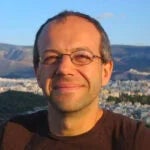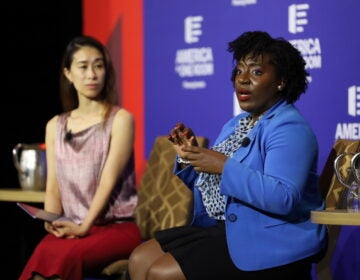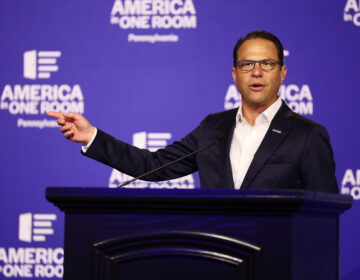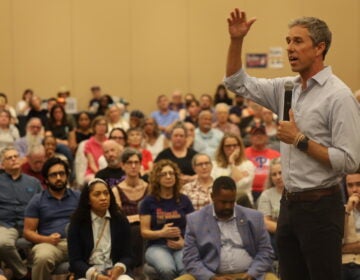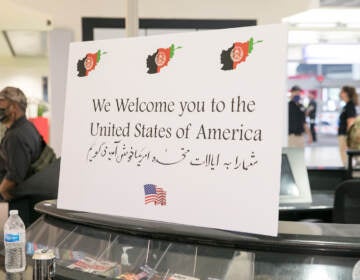Hillary Clinton makes surprise visit to Philly, talks foreign policy at forum with Pa. voters
Clinton talked trade, tariffs and Taiwan. Although she never mentioned President Trump, she warned that the U.S. is “giving away our power.”

File - Former Secretary of State Hillary Clinton speaks during the first day of Democratic National Convention, Monday, Aug. 19, 2024, in Chicago. (AP Photo/Jacquelyn Martin)
From Philly and the Pa. suburbs to South Jersey and Delaware, what would you like WHYY News to cover? Let us know!
Former U.S. Secretary of State and Democratic Party nominee for president Hillary Clinton addressed an audience of around 200 Pennsylvania voters Sunday morning, during which she discussed foreign policy and answered questions posed by participants on wide-ranging issues like defense spending, foreign aid, trade and China and Taiwan.
Clinton’s answers demonstrated a foreign policy philosophy that exemplifies broad global engagement, from foreign aid to military action. During the Q&A she was asked, “Rather than supporting other countries through diplomacy, military and financial support, would it be better to use those resources to address America’s problems first?”
Clinton used the example of efforts by agencies, such as the recently gutted USAID to prevent the spread of disease, to make the case why the U.S. should continue to provide global assistance, which she noted accounts for less than 2% of the federal budget.
“If you keep diseases out of your country, that’s good for us,” she said. “And we had what is called ‘soft’ or ‘smart power’ with our diplomats and with our development aid. I thought then, and I believe today, that is in America’s interests. It makes sense for us to be engaged around the world at a very small percentage of our federal budget to keep problems from affecting us, to support people who will be our friends and our allies, not our adversaries.”
In responding to another question about how the U.S. should “rethink the balance between defense spending and investments in diplomacy,” she quickly responded, “We need both.”
She later added that a stronger military provides necessary deterrence.
“I think you have to send a strong message to your adversaries that they better not mess with you because the consequences will be greater to them,” she said. “You have to invest in defense, [but] if you don’t have diplomacy before, during and after a crisis, it doesn’t matter how powerful you are, you can’t win or you can’t force an end to the conflict.”
Clinton served as secretary of state for four years under President Barack Obama. Prior to that, she represented New York as a U.S. senator, serving on the Foreign Relations Committee. More recently, the Clintons have led the Clinton Foundation, which focuses on global health, economic opportunity and climate change. Its projects include a local early literacy program in Pennsylvania.
Much of their work is funded by contributions from wealthy donors, large corporations and foreign states. Critics faulted the foundation’s acceptance of funding from Saudi Arabia and other countries during her 2016 run for president.
Clinton’s foreign policy philosophies have been described as liberal internationalism, defined by a blend of assertive diplomacy and strategic interventionism. She has emphasized the importance of American leadership in global affairs — arguing that sustained engagement, coalition building and a robust defense posture are essential for maintaining international order and advancing democratic values.
During her tenure as secretary of state, Clinton championed the “smart power” approach: a calculated mix of hard and soft power tools, including military force, economic sanctions and development aid. She supported the U.S. intervention in Libya, backed a troop surge in Afghanistan and advocated for a tougher stance on Russia. At the same time, she sometimes prioritized diplomacy through initiatives like the “reset” with Moscow and the Asia-Pacific “pivot.”
“Sometimes in politics or public policy, you got to do business with people you don’t like,” she said during the forum. “Just like you got to deal with people you don’t like in real life, you may not like them. You may not like their attitude, you may not appreciate their views,” but you work with them “for your own interests.”
Some of Clinton’s foreign policy philosophies were likely shaped by Henry Kissinger, secretary of state under Richard Nixon, whom she called a “friend” who provided “counsel” while she served in that role. Kissinger’s controversial realpolitik-driven foreign policy included orchestrating bombing campaigns in Cambodia and Laos during the Vietnam War and support for authoritarian governments in Chile and Argentina.
During the discussion in Center City, Clinton used her personal experience as secretary of state, as well as those of Bill Clinton from when he served as president. She noted that the “only two recent conflicts in Europe that have been ended were the conflict in Northern Ireland and the conflict in Southeast Europe, both of which my husband presided over,” explaining that the end to the conflict in Northern Ireland “was all diplomacy” while President Clinton “had to bomb Serbia, he had to bomb Belgrade to end the war in the Balkans.”
Clinton never mentioned President Donald Trump by name but alluded to current U.S. foreign policy. She denigrated the president’s tariffs and other policies. Asked whether the U.S. remained the “top superpower,” she answered, “I think we still are, but I’m not sure we will remain because we are giving away our power in ways that I think are very damaging to our leadership position in the world.”
“I personally believe it is in America’s best interest to remain the leader of the world and to assume the responsibilities of leadership,” she said. “I think it’s important because, otherwise, we will either create a vacuum that will be filled by a lot of bad actors and bad behavior, not just nation states doing things like invading other countries, but all kinds of criminal activity and cybercriminals in particular. So we will either remain the superpower or we will accede power to someone else, or we will end up with what are called spheres of influence.”
The session comprised the final part of America in One Room, a deliberative polling event held in Center City. Participants from around the commonwealth spent three days debating a wide range of political issues, with the final topics relating to foreign policy. Participants were not told that Clinton would be speaking until Sunday morning.
Patrick Dooley, a local participant, said everyone was surprised, adding he didn’t know until Clinton was introduced.
“No one let it out,” he said. “I thought it was an interesting choice. Obviously along political lines, some people probably were happy about it, but some people probably weren’t. But I enjoyed it.”

Get daily updates from WHYY News!
WHYY is your source for fact-based, in-depth journalism and information. As a nonprofit organization, we rely on financial support from readers like you. Please give today.


